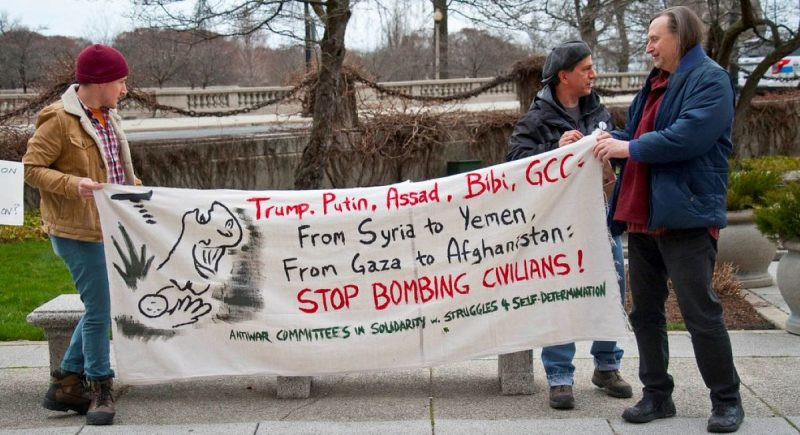‘The post-cold war era is over’, declare the leaders, ex-generals and most of the ex ambassadors, referring nostalgically to a mythical age of East and West dismantling the political and economic institutions of the Cold War. Jack Matlock, the historian-turned-diplomat who was US ambassador in Moscow between 1987-1991, bucks the ‘peace-washing’ trend and insists that the real history was very different.
As ex-ambassador Matlock implies, the reality was of political sabotage by NATO (effectively the US) of the opportunity arising from the dissolution of the Warsaw Pact to create a new integrated European security system. The current crisis in Ukraine, far from marking the end of the post-cold war peace, is a result of the supremacy of those with a vested interest in maintaining the divisive security institutions and militarist production priorities of the Cold War. The US driven sabotage of agreements made under Gorbachev and other European heads of states to equal security – ‘not to strengthen their security at the expense of the security of other States’ – has been well documented, both by leaders of the international peace movement and by more conservative commentators. Examples include this expose of the hubris liberals who pushed for NATO’s expansion and this even more direct piece on the culpability of NATO, which reinforce Matlock ‘s blunt conclusion: ‘NATO expansion was the most profound strategic blunder made since the end of the Cold War’.
The character of diplomacy is shaped by an underlying network of industrial vested interests in war. The radical sociologist C. Wright Mills coined the phrase ‘Military-industrial complex’ to describe the interrelationships between corporations – especially arms companies – and the state, and their potency in driving government policy towards military solutions to geo-political problems. Whilst Wright Mills was seeking to explain the US war on Vietnam, his concept is applicable to the current failure of the West to demilitarise the economy and reap the social benefits of the much talked of ‘peace dividend’. Paul Rogers, with documentation provided by the Campaign Against the Arms Trade, has demonstrated how the industrial military complex continued to reproduce the militarised economy of the Cold War.
More recently, Rogers described how the sheer momentum and power of military corporate interests undermined the drive for diplomatic solutions (for example agreeing to the neutrality of Ukraine and declaring a moratorium on new membership of NATO), instead creating favourable conditions for war.
The importance of building vested interests in peace
If the end of the Cold War was blocked by vested interests in war, we in the peace and democracy movement must renew our efforts to build more powerful vested interests in peace. This requires two combined strategies, both based on developing politically ambitious forms of citizen power in a context where corporations and political elites – disgracefully including the leadership of the British Labour Party – are entrenched in a political economy of war. On the one hand, we need to build on the initiatives of the 1970s to demonstrate the feasibility and desirability of converting the production of military products to socially useful forms of production. In the 21st Century this strategy will be strengthened by a growing interest in worker-led plans for a transition to a low carbon economy.
On the other hand, we must urgently develop solidarity with both the people of Ukraine courageously resisting the Putin invasion and the ‘no war’ movement of brave Russian citizens opposing the Putin regime. This is key to rebuilding and extending the ‘people to people diplomacy’ that contributed to the collapse of the elites of the USSR and its Central and East European puppets.
Red Pepper will be commissioning further articles on how we can collectively turn the widespread desire for peace into a practical material interest in peace which could finally end the Cold War – thirty years too late!










